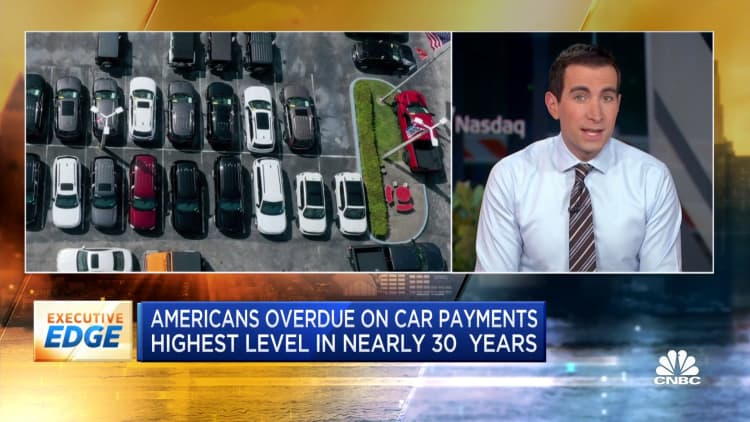Catherine Falls Commercial | Moment | Getty Images
If you’ve noticed the cost of your car insurance policy has gone up, you’re not alone. Inflation takes some of the blame, but your credit score may have a role as well.
The national average cost for full-coverage car insurance has gone up to $2,543 per year, according to Bankrate. That’s up from $2,014 in 2023 and $1,771 in 2022.
Today’s national average represents 3.41% of the median household income, according to the personal finance website, at a time when many Americans are still grappling with higher prices.
“We saw an increase of 26% between last year and this year,” Bankrate analyst Shannon Martin said.
The spike in prices is the result of multiple events that happened in a short period of time, she said.
High inflation that began in 2020 prompted the cost of vehicles and parts to go up, while there was also an increase in extreme weather claims, Martin noted. There was also a 10% increase in car crash fatalities in 2021.
“Insurance companies are trying to recoup those losses, and then project and estimate what the future risk will be,” Martin said.
More from Personal Finance:
Americans can’t pay an unexpected $1,000 expense
Why workers’ raises are smaller in 2024
The quiet luxury trend is out and ‘loud budgeting’ is in
The cost of car insurance varies across the country. For example, Detroit drivers stand to pay the highest average annual expense, with $5,687, or 7.98% of the median household income.
Other cities in Bankrate’s ranking of top five most expensive cities for car insurance include Las Vegas, Miami, Philadelphia and Tampa.
The least expensive city for full-coverage car insurance is Seattle, where drivers spend an average of $1,759 per year, or 1.65% of the median household income.
Other cities that were also categorized as least expensive include Boston, Minneapolis, Portland and Washington, D.C.
How credit score influences car insurance costs
Regardless of location, certain events will prompt higher car insurance costs.
The biggest culprit, according to Bankrate, is adding a teenage driver to your policy, which can result in an added $2,878 to average annual premiums, even higher than a drunk driving conviction, which can add an average of $2,247.
If your credit score decreases from good to poor, that can increase average annual costs by $1,795.
Credit can have a bigger effect than receiving a speeding ticket, which can add $523 in average annual costs, or a lapse in auto insurance coverage, which can prompt a $276 increase.
The good news is there are steps you can take as a driver to help mitigate some of those increases.
Not all states use credit as a rating factor to determine the price of your auto insurance policy, Martin noted. However, most do.

If you’re in a situation where your credit score is low enough to adversely affect your car insurance costs, you likely have recent delinquencies or other issues with debts that have not yet been resolved, noted Bruce McClary, senior vice president at the National Foundation for Credit Counseling.
“Try to make progress towards improving your score and improving your overall financial well-being to help get things back on track,” McClary said.
Having lower credit scores can raise the cost of other borrowing costs, such as credit cards, auto loans and mortgages.
To improve your score, it helps to pay your balances down and pay your bills on time.
You may also want to check for potential errors on your credit report, which may drag down your rating, McClary noted. Consumers can currently check their credit report from each of the three major credit reporting agencies every week by visiting AnnualCreditReport.com.
If you successfully raise your credit score, be sure to report that change to your auto insurer to have your policy adjusted, Martin said.
Other ways to reduce what you pay
If you have a teenage driver, you can have your child take an extra driver training class, which can result in an extra discount on your car insurance policy, according to Martin.
Students who have a certain grade point average in school may also be eligible for discounts, according to AAA, a provider of travel and insurance services.
Adult drivers may also be able to get discounts on their policies by completing drivers training courses or programs.
Drivers may also save by bundling insurance on their vehicle, home and other valuables, according to AAA.
They may also pay less by paying the policy in full up front, rather than in installments, which can come with fees.
Driving fewer miles may also qualify for car insurance discounts.
In addition, by increasing the deductible on the auto policy, or the amount you have to pay upfront in the event of a claim, you may lower the cost of your policy. Before you do that, be sure you have ample cash set aside.
Don’t miss these stories from CNBC PRO:

